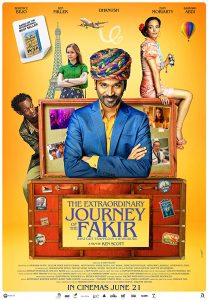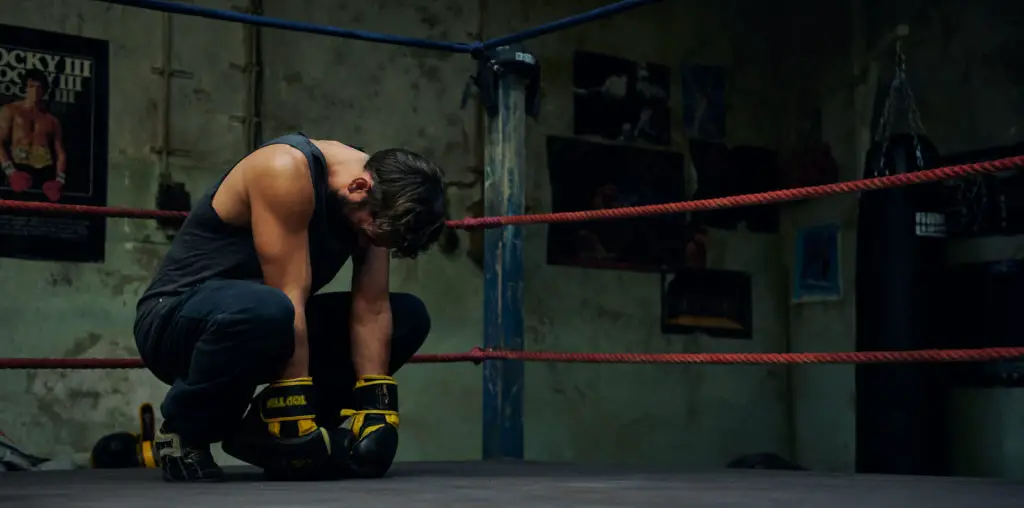
Every once in a while, a film combusts under the pressure of its affability. Basked in bright, multicolored hues, Ken Scott’s globe-trotting comedy The Extraordinary Journey of the Fakir attempts to be many things at once: a jovial farce, an eccentric musical, a cheerful fairy-tale, an affectionate rom-com, and even a solemn reminder of the current refugee crisis. The wildly uneven result winds up nauseatingly genial/sappy, despite boasting a charming lead and some inspired sequences.
“Once the tyranny of Chance starts laying down the law,” the wise narrator informs us at the start, “there’s no more playing field. Chance is everything. This is the story of Ajatashatru Lavash Patel, and these are the cards Chance dealt him.” (Side-note: The theme of “Chance” is consequently reiterated a million times throughout the narrative.) Our hero, the aforementioned Ajatashatru (Indian filmmaker, lyricist and playback singer Dhanush), proceeds to take over the narration; he’s a teacher, telling his “extraordinary” life story to three young troublemakers facing years of imprisonment.
Born in a small (highly-glamorized, alluringly colorful) Mumbai neighborhood to a hard-working single mother, young Ajatashatru’s a rascal, constantly thieving and causing trouble – oh, and seeing his father’s face on every street corner. This aggravates his mom; “You do not have a father!” she insists. She also promises to “take [him] to Paris one day” – if he stays out of trouble and eats his dinners, that is. Sheltered, with no TV or internet, Ajatashatru discovers the vastness of our beautiful world at school. Inspired by a local fakir, he utilizes his skillset to trick people with magic shows and stunts, determined to make enough cash to escape poverty and live happily ever after with his mother in France.

“…which leads to a series of misadventures, involving a briefcase full of cash, a hot-air balloon ride, and a cargo ship trip to Lybia.”
Sadly, Ajatashatru’s mother never gets the chance to go to Paris. Soon after her death, he flies “thousands of miles to Paris, in search of [his] father… with nothing more than [his] mother’s ashes, a passport, and a fake hundred Euro.” A meet-cute promptly happens at an Ikea-like store, when Ajatashatru meets Marie (Erin Moriarty), setting in motion a frenetic series of events (deep breath): an overnight stay in a Swedish closet leads to being trapped in a truck carrying illegal immigrants to London (led by Captain Phillips’ Barkhad Abdi), which leads to a frantic escape from the coppers, which leads to Ajatashatru’s passport being shredded, which leads to a trip to Barcelona, which leads to our hero meeting famous actress Nelly Marnay (Bérénice Bejo), which leads to a series of misadventures, involving a briefcase full of cash, a hot-air balloon ride and a cargo ship trip to Lybia.
You certainly can’t fault Scott and his crew for lack of ambition in terms of scope – though to be fair, quite a few of the locations our hero visits are barely glimpsed. Things happen quickly, in a rapid procession, smothering you with syrupy sentiments so vicious, even the breeziest of scenes get dragged down into the muck (the sap does function as a connecting thread in an otherwise-spastic narrative). One moment Ajatashatru is providing hope for dozens of homeless immigrants – a very tragic and real issue – yet next thing we know, he’s breaking into a song-and-dance routine at a club (with Bejo singing along, no less!). Chockfull of coincidences (a.k.a. ex-Machina tropes), the film vacillates so wildly, it spins out of control. As for the love story sub-plot – the less said about the poor, vacuous hole of a character that is Marie, the better.

“Nicolas Errèra’s eclectic score incorporates Indian and French (read: accordion) motifs, and cinematographer Vincent Mathias captures… countries… with vivid glory.”
That’s not to say that this Journey is a complete disaster. Scott shows that he’s adept at handling more nuanced, quieter, tongue-in-cheek moments. Ajatashatru carries most of the dodgy sequences; for instance, he doesn’t mind being ripped off by an uber-happy French Uber driver, because “for the first time, I was the rich tourist” (he ends up giving the driver his fake bill anyway). When he tells Marie about Mumbai, there’s a sweet little snippet of the two being immersed into the exotic, spice-scented environment of his home. Some funny business involving a pair of handcuffs, and a tragically hilarious sequence at a Spanish airport crammed with refugees, hint at the things that could have been. Nicolas Errèra’s eclectic score incorporates Indian and French (read: accordion) motifs, and cinematographer Vincent Mathias captures the countries that the budget allowed him to capture with vivid glory.
But then there’s the dialogue, which could have used a good scrubbing, to get all that sap off an already-sappy narrative (have I said “sap” enough?) “Have you ever been in love?” Ajatashatru intones, straight-faced. “Living rooms aren’t just about the designs, but how you feel when you enter them,” he later says to Marie – instantly wooing her, of course. “I know we met only once,” he tells her at the end, “but our kiss was inspiring.”
There were two minutes of company credits before the film even began. Clearly, a lot of international financing, as well as perseverance, love, and affection went into making The Extraordinary Journey of the Fakir. Judging by the photo stills supplementing the end credits, it’s been quite the extraordinary journey. Too bad it doesn’t translate on-screen.

"…there’s the dialogue, which could have used a good scrubbing..."

